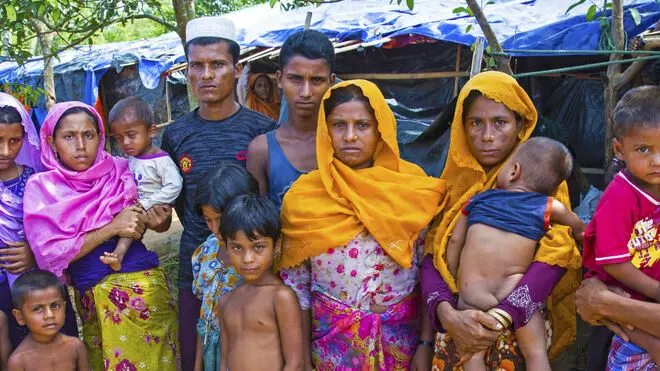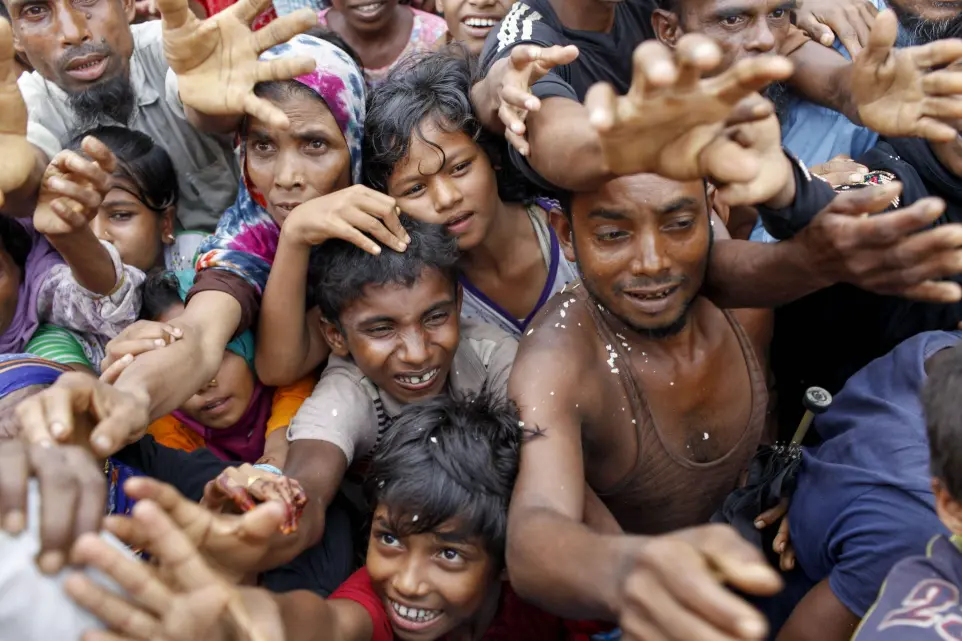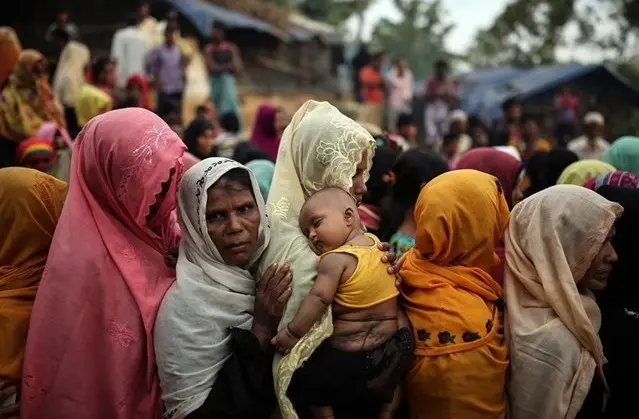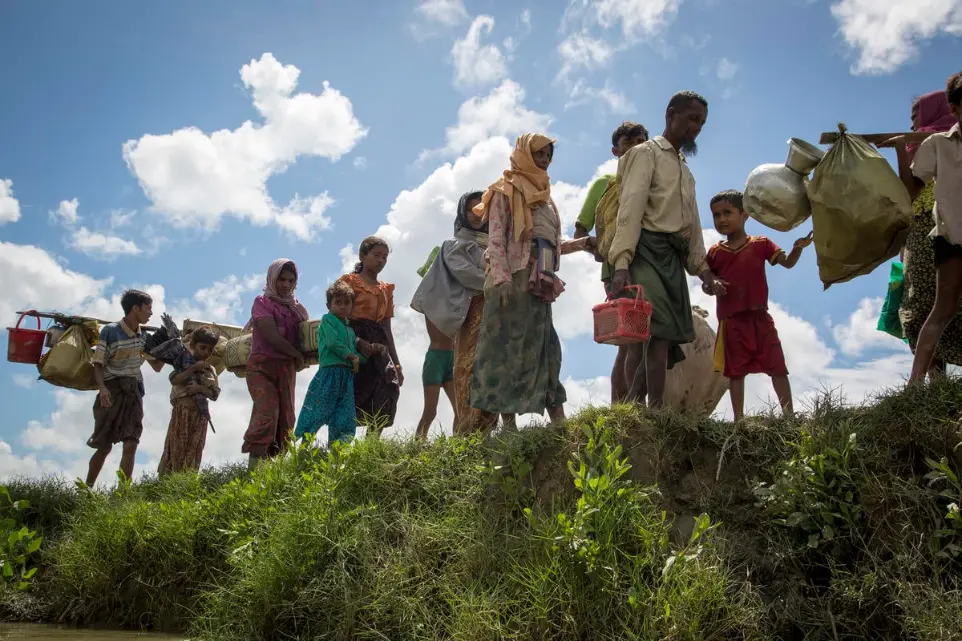



The Rohingya Dilemma: Genocide and Displacement in Myanmar
Here you will find a space dedicated to a detailed exploration and in-depth analysis of human rights at the global level. You will delve into the complex reality of this community and the violations of their rights. Prepare to discover a shocking and crucial issue in the fight for justice and equality!
Introduction
The Rohingya are a Muslim ethnic group that has lived in Rakhine State, Myanmar, for centuries. Despite their long presence in the region, they have faced discrimination and persecution from the government and the Buddhist majority in Myanmar. Over the years, they have been denied citizenship, leaving them in a situation of legal and social vulnerability.
The lack of recognition of the Rohingya as citizens of Myanmar has contributed to their exclusion from political participation, as well as limited access to basic services such as education and healthcare. This marginalization has exacerbated ethnic tensions in the country and created a context conducive to violence against the Rohingya.
Historical discrimination and the lack of recognition of their rights as citizens have created an environment of vulnerability for the Rohingya, which has contributed to the humanitarian crisis they face today.
Currently, the Rohingya in Myanmar face a severe humanitarian crisis due to the violence and persecution they suffer. Reports indicate that thousands of Rohingya have been killed and that many women have been victims of sexual violence. Furthermore, it is estimated that hundreds of thousands of Rohingya have had to flee their homes to seek refuge in neighboring countries such as Bangladesh.
The humanitarian situation in the refugee camps where displaced Rohingya are located is precarious, with extremely difficult living conditions. The lack of access to food, clean water, and adequate medical care has exacerbated the suffering of this community. Despite the efforts of humanitarian organizations and the international community, the crisis persists and the situation of the Rohingya remains desperate.
The current situation of the Rohingya in Myanmar represents one of the most urgent and serious humanitarian crises globally, requiring immediate attention and coordinated international action to address the violence, displacement, and extreme vulnerability facing this community.
The genocide and forced displacement of the Rohingya in Myanmar have had devastating humanitarian, social, and political consequences. Violence and persecution have left deep wounds in the Rohingya community, generating individual and collective trauma that requires specialized care and psychosocial support.
Furthermore, forced displacement has severely disrupted the lives of the Rohingya, depriving them of their homes, livelihoods, and sense of security. This loss of roots and belonging has had a significant emotional and psychological impact on the community, contributing to the urgency of providing comprehensive support for their recovery and reconstruction.
At the political level, the genocide and displacement of the Rohingya have posed significant challenges for Myanmar and the international community in terms of accountability and justice. Finding sustainable solutions to the Rohingya situation requires addressing not only immediate humanitarian needs, but also accountability for crimes committed and establishing conditions that guarantee the safety and rights of this community in the future.
Genocide and Displacement in Myanmar: Legal Context
The conflict in Myanmar has received international attention, and significant efforts have been made to recognize the situation of the Rohingya as a case of genocide. In 2018, the UN issued a report describing the atrocities committed against this ethnic group as a clear example of genocide. This recognition has been supported by numerous human rights organizations and has led to increased scrutiny of the Myanmar government's actions.
Furthermore, several countries have condemned the acts of violence against the Rohingya and urged Myanmar to take concrete steps to stop the genocide. This condemnation has been backed by UN General Assembly resolutions, underscoring the international consensus on the gravity of the situation.
Recognition of genocide by the international community is a crucial step in holding perpetrators accountable and seeking justice for victims. However, despite this recognition, significant challenges remain in finding effective solutions to stop the genocide and protect the Rohingya population.
The conflict in Myanmar and the situation of the Rohingya have had significant repercussions on the global community. International organizations, such as the United Nations, have strongly condemned the actions of the Myanmar government and urged action to stop the violence and protect the human rights of this persecuted minority. Furthermore, several countries have imposed sanctions and trade embargoes on Myanmar in response to the ongoing humanitarian crisis. The issue has been the subject of debate in international forums, placing additional pressure on the Myanmar government to address the situation of the Rohingya and end human rights violations.
The Rohingya crisis has also generated global solidarity and support. Various NGOs, activists, and human rights defenders have raised their voices to raise awareness about the plight of this community and advocate for stronger international action. The dissemination of information through social media and the media has contributed to raising public awareness about the conflict, mobilizing global opinion in favor of protecting the Rohingya and seeking long-term solutions to their situation.
Furthermore, the Rohingya crisis has sparked intense debate about the responsibility to protect and the role of the international community in preventing and resolving conflicts that threaten the safety and dignity of vulnerable populations. This case has tested the effectiveness of international mechanisms to address situations of genocide and forced displacement and has prompted reflection on the need to strengthen global cooperation to prevent future humanitarian crises of this magnitude.
Forced Displacement and Humanitarian Crisis
The Rohingya crisis in Myanmar has led to extremely precarious conditions in refugee camps. The lack of basic resources such as food, clean water, and medical care has created a desperate situation for thousands of people who have had to flee the violence in Myanmar. Overcrowding in refugee camps, combined with scarce resources, has created an environment conducive to disease and malnutrition, further exacerbating the plight of displaced Rohingya.
The lack of adequate infrastructure and safe housing has created an unhealthy and dangerous environment for people seeking refuge in the camps. Furthermore, exposure to extreme conditions and a lack of adequate hygiene have led to disease outbreaks, worsening the humanitarian crisis in the region.
The international community has expressed its deep concern about the conditions in the refugee camps and urged Myanmar to ensure dignified and humane treatment for displaced Rohingya, as well as to allow humanitarian organizations access to provide lifesaving assistance to those affected.
The situation in Myanmar has resulted in limited access to humanitarian assistance for displaced Rohingya. Restrictions imposed on international and local organizations have made it difficult to deliver humanitarian aid to those most in need. This limited access to humanitarian assistance has exacerbated the humanitarian crisis and left thousands of people without access to food, shelter, and medical care.
The lack of access to humanitarian assistance has also had a significant impact on organizations' ability to provide psychosocial support to those affected. Psychological and emotional care is crucial for those who have experienced significant trauma and loss, and limited access to these services has left many displaced Rohingya without the necessary support to cope with the emotional aftermath of the crisis.
The international community has urged Myanmar to lift restrictions on humanitarian assistance and ensure unhindered access so that organizations can provide lifesaving aid to the affected population. The need for urgent humanitarian assistance is crucial to alleviate the suffering of displaced Rohingya and to effectively address the ongoing crisis.
The psychosocial impact of the crisis on the Rohingya community has been profound and long-lasting. Violence, forced displacement, and the loss of loved ones have left emotional scars on many people, especially children and the most vulnerable populations. The trauma generated by these experiences has had a significant impact on the mental health and well-being of the Rohingya community.
Lack of access to mental health services and psychosocial support has left many people without the necessary resources to cope with and overcome trauma. Stigma and discrimination have also exacerbated the suffering of the Rohingya community, further hindering their ability to recover and rebuild their lives in a safe and welcoming environment.
It is critical that adequate psychosocial support be provided to the Rohingya community to help mitigate the emotional impact of the crisis. Access to mental health services and emotional support are essential components for the recovery and resilience of those affected by the crisis in Myanmar. Long-term attention to the psychosocial needs of the Rohingya community is crucial to their recovery and ability to rebuild their lives in a safe and protective environment.
Challenges and Future Outlook
The repatriation of Rohingya refugees to Myanmar has been hampered by several complex factors. One of the main obstacles is the lack of safety and security guarantees for Rohingya returning home. Furthermore, the lack of recognition of citizenship and systematic discrimination by the Myanmar government greatly hinder the reintegration of this community into society.
Another major challenge is the destruction of Rohingya villages and homes in Myanmar, which raises the question of property restitution and compensation for losses suffered during the conflict. Without a comprehensive approach to addressing these issues, the effective repatriation and reintegration of the Rohingya are seriously jeopardized.
Furthermore, the lack of access to basic services such as education, healthcare, and decent employment represents an additional challenge to the successful reintegration of the Rohingya in Myanmar, requiring a coordinated and sustained approach from the international community and the Myanmar government.
In the long term, a sustainable resolution to the Rohingya crisis in Myanmar will require a comprehensive approach that addresses both the underlying causes of the conflict and the immediate needs of the displaced population. This will include ensuring full citizenship and rights for the Rohingya, as well as concrete measures for reconciliation and transitional justice.
Furthermore, it will be crucial to work on rebuilding Rohingya communities and creating conditions that enable their safe and dignified return. This will involve cooperation between the Myanmar government, humanitarian agencies, and the international community to address the housing, education, health, and livelihood needs of the repatriated Rohingya.
Ultimately, resolving the Rohingya crisis will require a long-term commitment to ensuring the safety, dignity, and human rights of this marginalized community in Myanmar.
Conclusions
Ongoing Impact of Genocide and Displacement in Myanmar
The genocide and displacement in Myanmar has had a devastating and ongoing impact on the Rohingya population. Since the beginning of the crisis, it is estimated that more than 700,000 Rohingya have fled the country, seeking refuge in Bangladesh and elsewhere. This humanitarian crisis has left thousands homeless, exposed to violence, and with limited access to food and basic services. Furthermore, many Rohingya who remain in Myanmar face discrimination, movement restrictions, and precarious living conditions in displacement camps.
The psychological and emotional impact of the persecution and violence suffered by the Rohingya population is incalculable. Many survivors suffer from post-traumatic stress disorder, depression, and anxiety, highlighting the urgent need for psychological support and adequate medical care for this community.
Furthermore, the genocide and displacement in Myanmar has had global repercussions, raising a call to action on the importance of protecting human rights and preventing future humanitarian crises. The international community has risen to the challenge of providing large-scale humanitarian assistance and pressuring the Myanmar government to halt the violence and ensure the safe and dignified return of the Rohingya to their homes.

 IHRO NEWS
IHRO NEWS